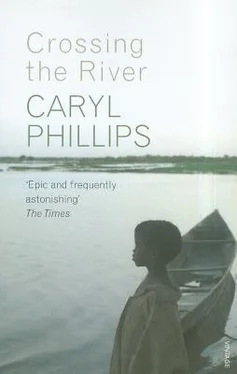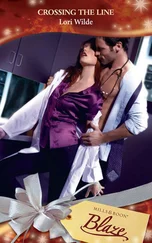Caryl Phillips - Crossing the River
Здесь есть возможность читать онлайн «Caryl Phillips - Crossing the River» весь текст электронной книги совершенно бесплатно (целиком полную версию без сокращений). В некоторых случаях можно слушать аудио, скачать через торрент в формате fb2 и присутствует краткое содержание. Год выпуска: 2006, Издательство: Vintage, Жанр: Современная проза, на английском языке. Описание произведения, (предисловие) а так же отзывы посетителей доступны на портале библиотеки ЛибКат.
- Название:Crossing the River
- Автор:
- Издательство:Vintage
- Жанр:
- Год:2006
- ISBN:нет данных
- Рейтинг книги:4 / 5. Голосов: 1
-
Избранное:Добавить в избранное
- Отзывы:
-
Ваша оценка:
- 80
- 1
- 2
- 3
- 4
- 5
Crossing the River: краткое содержание, описание и аннотация
Предлагаем к чтению аннотацию, описание, краткое содержание или предисловие (зависит от того, что написал сам автор книги «Crossing the River»). Если вы не нашли необходимую информацию о книге — напишите в комментариях, мы постараемся отыскать её.
Crossing the River — читать онлайн бесплатно полную книгу (весь текст) целиком
Ниже представлен текст книги, разбитый по страницам. Система сохранения места последней прочитанной страницы, позволяет с удобством читать онлайн бесплатно книгу «Crossing the River», без необходимости каждый раз заново искать на чём Вы остановились. Поставьте закладку, и сможете в любой момент перейти на страницу, на которой закончили чтение.
Интервал:
Закладка:
When he finished, there was silence. We all turned and looked back at the town. Fires were still blazing, but we couldn’t hear any more planes. Maybe it was over? Len whispered in my ear, I’m off to the pub. I’ll see you back later. I watched him and his mates walk off. I even heard them laughing. I imagined that I could hear the sound of the ‘All Clear’ in the distance. But, of course, I heard nothing. And then I looked around at the vicar who was praying, stiffing his fear between two folded hands.
DECEMBER 1940
Today I took a bus down to the town to find my mother. I hadn’t slept much. In fact, I hadn’t really slept at all, but I felt wide awake. The countryside looked much the same, but when I saw the town, I wanted to cry. Tram lines were twisted like liquorice. Iron girders were discarded across the street, jutting up into the air and pointing towards the now empty grey sky. I couldn’t believe that this was my town. The bus couldn’t go any further, so we all got off and began to walk. I stared at buildings that were now reduced to one or maybe two walk. Neat rectangular holes that used to be windows provided useless ventilation. Everywhere I looked I could see mountains of rubble, crushed cars, and battered trams. Up above me, the loose, swinging arms of cranes picked their way over the carcass of the town. And in the streets, men with flatcaps and women with head-scarves scavenged at the ruins of their houses, avoiding any hot debris, trying to find bits of furniture, photographs, anything that remained of their lives. As they did so, others — maybe family members — stared on, dumbstruck. I stepped gingerly around a sea of broken glass, and then saw a formal queue of parents taking turns to lift their children into the cockpit of a crashed Jerry bomber. I wondered about the pilot, and then realized that I should be wondering about my mother. I increased my pace. Down a side street, I saw charred bodies covered in soot and glass. Then I realized that they were just Burton’s dummies. It occurred to me that I was lost. That all the familiar landmarks had gone and that I was no better than the sad woman I saw wandering with a bird cage in one hand and some photographs in the other, singing ‘It’s a long way to Tipperary’. The bashing had obviously sent her beyond. I asked for directions from an ARP who looked half-asleep underneath his tin helmet. He said nothing, but simply pointed me towards a junction that I recognized. I wanted to ask him about the football rattle in his hand, but he looked too tired to answer, so I just said thank you. He nodded a quick acknowledgement. I walked on knowing that there was no longer any such thing as a familiar route. Fire hoses like long, endless snakes were strewn across the roads. Fires still spat, but down here the odd girder was all that remained of most buildings. I saw groups of patient employees standing outside shops and offices with no idea of what to do, their work places wrecked. The whole town was in a state of shock. Everyhody seemed to be suffering their own private war tragedy. The odd car rolled by at a funereal pace, but heads didn’t turn. People simply gawked at the destruction. I turned off the main street and continued to pick my way through the back streets. I looked on at the ATS girls, who seemed to be working non-stop, helping the police, driving, standing side by side with the ARPs. They made me feel useless.
DECEMBER 1940
I suppose I knew that she’d be dead before I got there. It didn’t seem possible that others should have died, but not her. I saw the house, or what was left of it. A gap in the street, like a broken tooth. There were no windows, the front door hung off its hinges, and I could see that the ceiling plaster was down and that soot and dirt were everywhere. Nothing looked burned, so I knew that it wasn’t an incendiary. These could be put out with earth and water. That much I’d managed to understand from the papers, not that she would have bothered to do anything about it. It looked like the blast had come from a nearby bomb. And then I saw that the houses across the road had been hit. The ARPs were still cordoning off the road. I saw old Mr Miles. On his back he had a leather coat so mangled it looked like someone had thrown a dead cow over him. When he saw me, he handed his roll of string to another warden. I ducked under the barrier. He put his hand on my shoulder. I’m sorry, love. He took off his tin helmet. You know what she was like. She wouldn’t go in the shelter. She made us laugh, though. She said, I’ve never had a front seat in a war, and I’m not missing my chance now. Where is she? I asked. They’ve taken her off in a corporation bus with the others. It were not good around here as a lot of folk took their chances. They weren’t banking on a direct hit. If you’re a bit squirmish, you’d best make yourself scarce. We’re not finished yet, and there’s more trapped under that lot. I looked behind him as his fellow men, cigarettes dangling from their lower lips, feet stamping to keep themselves warm, shovels in hand, prepared to dig again in the rubble. You’ll get a chance to see her later, love. They’ll not be burying anyone for a while. Can’t do nothing for them. I expect they’ll want you to give identification. And don’t worry about your household salvage. There’ll be no looting while we’re about. So don’t worry. You can come back later today, or tomorrow. Sort out your stuff. I looked into Mr Miles’s tired and crease-lined face, and I knew that this kind old man was near the end of his tether. I wondered how many others he’d had to talk to like this.
DECEMBER 1940
By mid-afternoon it had started to snow. I was sitting in the park watching the endless flow of people filling tin baths from the lake. There was no water. After Mr Miles had sent me on my way, I spent a couple of hours wandering around the town in a daze. I’d noticed the long queues at standpipes. In some lucky streets, the water cart arrived with its large round cylinders. People with buckets and jugs and saucepans, whatever they had, pushed and shoved. The water, flecked with charcoal and lime, spluttered out of large taps, but at least you could drink it. And then the water-cart man shut off the taps and there was no more. That’s it until tomorrow, loves. And off he went to another lucky street. Some went back to the standpipes. I continued to walk and saw folk rummaging like paupers among the rubble of their houses. I spied on people’s lives. The fronts of their houses were often blown clean off, leaving the furniture still arranged, books and crockery in place. In one house, a hole in the back of a cabinet, that must have been previously hidden against a wall, was now revealed for all to see. Nearly everybody’s roofing slates had slid down and into the street, exposing sad, gaping lattice work. Some had been really unlucky. The insides of their houses had collapsed, mixing brick, wood and glass with papers, curtains and clothes. Ladders were up against what walk remained, and broken furniture was stacked neatly on the pavement. I couldn’t stand it any more. The Church Army Mobile Canteens, the WVS Mobile Canteens, the Salvation Army Mobile Canteens, all bringing food and drink to the workers and the homeless. In one street, Jerry had dropped a thousand-pounder bang in the middle of the tram track. The overhead wires were all down. A little girl was bawling as she looked at the burned-out shell of the tram. And outside a barber’s shop, a sign: ‘We’ve had a close shave. Come and get one yourself.’ I walked on in my dazed state, trying not to think of her lying wherever she was. And then I went into the park where I must have fallen asleep. The snow woke me up, cold flakes slapping against my cheeks. I opened my eyes and peered through the pale, watery light of afternoon. It was then that I saw people filling tin baths from the lake. I decided to go back to the village. There was no point in going back to the house and sorting through her things. They’d be wet and useless. And no point in going to find her. She didn’t need me at this moment. I decided to get back to Len. To get back to the village.
Читать дальшеИнтервал:
Закладка:
Похожие книги на «Crossing the River»
Представляем Вашему вниманию похожие книги на «Crossing the River» списком для выбора. Мы отобрали схожую по названию и смыслу литературу в надежде предоставить читателям больше вариантов отыскать новые, интересные, ещё непрочитанные произведения.
Обсуждение, отзывы о книге «Crossing the River» и просто собственные мнения читателей. Оставьте ваши комментарии, напишите, что Вы думаете о произведении, его смысле или главных героях. Укажите что конкретно понравилось, а что нет, и почему Вы так считаете.












